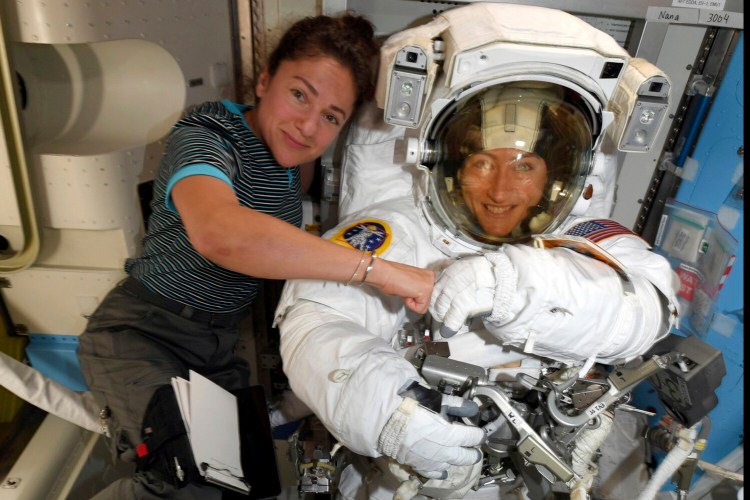If everything goes as planned, sometime in the next couple of days, Jessica Meir will take a step out of the International Space Station — and into the history books.
According to NASA, the 42-year-old astronaut and Caribou native will conduct a spacewalk Thursday or Friday with fellow American Christina Koch, heading out into the vacuum of space to replace a power controller that failed over the weekend.
Meir, who is on the ISS for a six-month mission that began in September, is the first Maine woman to go to space, following Charles O. Hobaugh of Bar Harbor and Christopher Cassidy of York. She will also be part of the first all-female spacewalk ever, fulfilling a dream that started when she was 5, and which is memorialized in her high school yearbook.
When she pushes free of the space station, some 260 miles above Earth, Meir will take in a point of view only a couple of hundred people have ever enjoyed. Aleksei Leonov, the first person ever to walk in space, called it “indescribably beautiful.”
Leonov, a Russian cosmonaut, floated in space for 12 minutes on March 18, 1965, beating American Edward H. White II by two and a half months. The feat notched another victory in the space race for the Soviets, who were also the first to launch a satellite and to put a manned flight into orbit.
But it nearly cost Leonov his life. While outside the spacecraft, Leonov’s suit unexpectedly inflated, preventing him from getting back inside. He was forced to release pressure from it slowly, placing himself in danger of decompression sickness.
The way home didn’t go as planned either. The spacecraft’s re-entry system failed, so Leonov and his co-pilot had to manually guide it back to the surface, missing their landing spot by about 1,000 miles. The pair spent two days deep in the forest of the Ural Mountains before they could be rescued.
Leonov likely would have been the first man on the moon had the Soviets won that segment of the space race. Instead, he returned to space in 1975 as part of a joint U.S.-Soviet mission. Leonov’s Soyuz 19 capsule docked with an Apollo spacecraft, allowing him to shake hands with American Thomas P. Stafford.
It was the small first step of a sometimes-rocky detente in the space race. Leonov said such cooperation came too late.
“If we could have gotten together earlier,” he wrote in 1990, according to his obituary in The Washington Post, “we would already have built an international observatory on the moon and would be flying to Mars right now.”
That vision has come to life at the ISS. Since the first crew arrived in 2000, scientists from 18 countries have gone there to conduct zero-gravity experiments. Meir flew there — on a Soyuz rocket, no less — with astronauts from Russia and the United Arab Emirates.
A lot of history and progress has been made on the ISS in the last two decades. Soon, a native Mainer will make some more — and her proud home state will be watching.
Send questions/comments to the editors.


